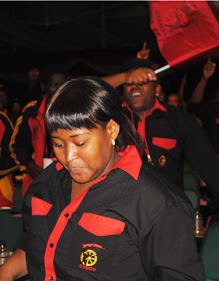|
Getting your Trinity Audio player ready...
|
 About 200 union members took a firm stand against corruption by signing Corruption Watch’s pledge during Cosatu’s 11th National Congress, held at Gallagher Estate last week.
About 200 union members took a firm stand against corruption by signing Corruption Watch’s pledge during Cosatu’s 11th National Congress, held at Gallagher Estate last week.
The four-day conference, which ran from 17 to 20 September, was attended by 3 000 Cosatu members and attracted trade union representatives from neighbouring countries such as Angola and Botswana, as well as from the international trade union federations.
Corruption Watch was among many organisations that set up exhibitions. Its stand provided a discussion space for delegates and to answer any questions they may have had on how the group worked. Visitors to the stand were encouraged sign the anti-corruption pledge and to give reasons why they thought it was important to do so.
In the eight months since Corruption Watch was launched, many reports have been received through its reporting system, a significant number of them in the areas of procurement. There have also been reports concerning appointments and conflicts of interest. Cosatu represents 2,2 million South African workers, many of whom are confronted by corruption at many different levels and in many different sectors – which makes them essential in the fight against corruption.
During the conference, many workers said that they were scared to report corruption they experienced or saw happening. At least one person reported an incident via the website at the stand. A few others disclosed incidents of corruption in their spheres of work, but said they were afraid to make official reports for fear of persecution and even death.
Corruption is like cancer
However, union members who signed the anti-corruption pledge told Corruption Watch it was important to educate the public about what corruption was and how it affected ordinary citizens. “Corruption is like a cancer, slowly but surely [it] eats up integrity of our leadership and increases the rich and poor divide,” said one as he signed the pledge.
“The system perpetuates corruption,” said another.
A trade unionist from Botswana pointed out: “The more people are informed about corruption, the more they identify it, and the more they stand against it.” Education was imperative in both the public and private sectors, he added.
The majority of members who signed the pledge were positive that through individual and collective action corruption could be reduced, with some saying: “We have to stand together as comrades and uproot corruption.”
Stealing from the poor
Cosatu general secretary Zwelinzima Vavi shared these sentiments, emphasizing that corrupt union leaders needed to be dealt with decisively. “[If a union leader is corrupt] it means that person is not our friend,” lamented Vavi. “Corruption is about stealing from the poor. [We can’t] keep quiet when someone is doing an obvious wrong because it is our person.”
The new tendency of tenderpreneurs represented a serious threat to the revolution and they must be isolated and exposed, he added. Vavi took a firm stand, claiming that South Africa was experiencing a full-blown crisis of corruption.
“In the past four years there has been a crisis of legitimacy, leadership and corruption,” he said, warning delegates of the dangers of corruption and making it clear that it would not be tolerated among union leaders.
“If a person is leading workers, don’t allow that leader to also be involved in business,” said Vavi. “If a person is leading government do not allow that leader to be in business at the same time. When your families are involved in business create a wall, protect the integrity of the organisation.” Family members of union leaders and government officials must not be allowed to do business with the institutions they led.
According to the Organisational Report of the 11th National Congress, Cosatu has improved its participation in the National Anti-Corruption Forum (NACF), which was launched in June 2001 in response to a resolution made at the first National Anti-Corruption Summit held in April 1999. The organisation participates in the civil society sector of NACF. A number of priority areas have been identified, including acting on earlier resolutions of NACF; and building and strengthening institutions to address corruption, such as Chapter 9 institutions and the Cosatu-driven initiative Corruption Watch.
Cosatu is committed to the establishment of an independent, statutory anti-corruption body, pursuing active engagement on the Protection of State Information Bill and addressing corruption in business, the report says.
Fanon’s dysfunctional state
Addressing the delegates, political analyst Dr Somadoda Fikeni said that South Africa had become the dysfunctional state that post-colonial thinker Frantz Fanon had warned Africa about in his article The Pitfalls of National Consciousness. “He was trying to warn us about the character of a new class of leaders,” said Fikeni. “We may not transform the state but we may be transformed by the state. So the question we want to answer here is: under which circumstances do agents get transformed by the institutions they sought to transform?”
He said in just 18 years South Africa had drifted into becoming the most unequal society in the world. “We have allowed crass materialism amongst us to become such a phenomenon as if we are possessed by spirits,” exclaimed Fikeni, who told delegates that corruption weakened a state’s capacity and delayed the delivery of services.
“Inequality is growing because people are obsessed with tenders.” He slammed government officials for spending state money on year-end parties, holidays and shopping sprees overseas. “This country has money everywhere except where it is needed,” he stressed.
Image

Excerpt
Corruption was firmly on the agenda of the 11th National Congress, where hundreds of members were spurred to sign the Corruption Watch pledge.
File Upload


